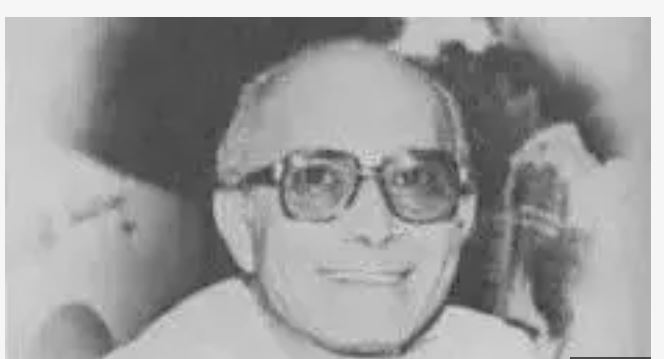
Raft Alhajan: Egypt's legendary spy 'No. 313' was the national hero or Israeli double agent?
In the late 1980s and the early 1990s, millions of Egyptians saw the television series ‘Rafat al -Hajan’, showing the adventures of an Egyptian spy known as ‘David Charles Samhone’ in Israel, who traveled freely across the country to send information to Egypt.
Rafat Ali Sulaiman Jamal was the real name of Raft Alhajan. It is one of the most exciting and mysterious stories in the history of Egyptian intelligence. This story has been recorded in Saleh Morsi’s book ‘I Was a Spy in Israel’, ‘Spy in Israel’.

This book is considered an important source of information about the life of Rafat Jamal. It tells the story of a man who lived in Israel for 17 years with misinformation and provided important information to the Egyptian intelligence service.
Saleh Morsi first published this story in Egyptian magazine ‘Al -Masour’. Its first episode was published on January 3, 1986, and from the same day the story was able to attract readers’ attention and people began to wait patiently for his next installments.

Morsi combined the story in 1988 and published it under the name of ‘I Waz A Spy in Israel’. Then the book was put into the TV series under the name of ‘Raft -ul -Hajan’ and it was presented in three installments.
While this series and book presents Rafat Jamal as an Egyptian national hero, Israel has published stories that question Jamal’s loyalty to Egypt and claim that he was in fact a double agent.
The beginning of spying
According to Saleh Morsi, Rafat Jamal was born on July 1, 1927 in the Egyptian city of Damit and increased in poverty.
His father was a coal trader. After the death of his father in 1936, Rafat’s eldest half -brother Sami, a teacher, who was a teacher, decided to move the family to Cairo, where Rafat enrolled in Commerce School.
After graduation, Rafat applied for an accountant job at an oil company in the Ocean area, but shortly afterwards he was fired on charges of embezzlement.
After the incident, they could not find a permanent job until they traveled to various European ports and hired an Assistant Accountant on a ship.
Jamal was a enthusiastic young man who showed his tremendous abilities to be in harmony with different situations. He had mastered English and French at a young age, which later worked
Rafat Jamal’s cooperation with the Egyptian Intelligence Service began after the July 1952 Revolution, when the Egyptian General Intelligence Service was now headed by Zakaria Mohiuddin.
During his journey to Europe, Jamal was found involved in fraud and fraud, which led to his arrest in Egypt in 1952.
At that time, the Egyptian Intelligence Service saw their counterfeiting capabilities and the opportunity to make them a numerous identity and recruit them as a spy.
The Egyptian Intelligence gave two options to Rafat: ‘Cooperation as a prison or an agent.’ After selecting the latter, he started a very tough training course, which included learning spying techniques, the use of not -visible ink, di coding, working with radio, and secret cameras.
He also received Jewish customs training in the meantime. He also learned about the differences and differences between the Jewish sectarian Ashkazi and Safar, to help them adapt to Israeli society.
He was then given a new identity called ‘Jacks Batten’. He moved to Israel in 1955 as an Egyptian Jew.
In this way, he began his mission as a spy in the heart of Israeli society. In the television series, Saleh Morsi renamed ‘Jacks Batten’ to ‘David Charles Samhon’.
In the heart of Israel

According to Saleh Morsi, Rafat Jamal managed to establish a vast network of contacts in Israel. He founded a tourist company called ‘Sei Tours’ that served as a cover for his spying activities.
The company also gave them the opportunity to connect with important figures of Israeli society, including some politicians and military personnel.
Jamal was the master of charismatic personality, so he could enter Israeli society. During his stay, he provided important information to the Egyptian intelligence, especially about Israeli military preparations.

The Egyptian army surprised the Israeli army and crossed the Bar-Lev line, which was nicknamed at the time the strongest military defensive fortress
According to Egyptian sources, one of Jamal’s most important achievements was his role in the October 1973 war. He provided detailed information about Egypt about the Barliel Line (Barlelyf Line), which played a vital role in the success of the Egyptian army at the beginning of the war.
In Morsi’s book, Rafat Jamal is presented as a patriot who has sacrificed for his country despite his contradictory life. He lived a dual life, living as a successful Jewish businessman in Israel, but secretly he continued to send information to Egypt.
He said he was born on August 23, 1929 with a French businessman in Mansura, Egypt. According to his new identity, his father worked in Egypt and married an Egyptian woman who had two sons. Jacks was older while his younger son Robert committed suicide
According to his story, after the death of Jacques’ mother, her father married a French woman who had two daughters from her former marriage. Jacques had an unpleasant living with their new family, and eventually he found better to flee home.
After the death of her husband, Waltrod Batten also told how Rafat Jamal had succeeded in identifying an Israeli spy Eli Cohen, who was working in Syria as ‘perfect Amin Sabit’.

Eli Cohen: Who was the Israeli spy who infiltrated Syria in the 1960
He says Jamal met Cohen in Cairo in 1954. At that time, the two were arrested on charges of espionage for Israel. Then Jamal saw pictures of Cohen in an Arabic newspaper that he was seeing with Syrian officers. They reported this to the Egyptian intelligence, which reported in the evening, and Cohen was arrested and hanged.
Israel’s statement
Contrary to the Egyptian statement, Israel offers a very different story about Rafat Jamal.
According to reports published in Israeli newspapers such as Hartz and Yediothhronoth, Rafat Jamal served as a ‘double agent’ after being identified and arrested in Israel in 1955.
According to Israel, when he arrived in Israel under the name of Jacks Batten, Israel’s Internal Security Service, Shabak, learned of Jamal’s spying activities through his business partner, Emery Farid, who worked for the organization.
According to this, security forces raided his house in Tel Aviv, and during the interrogation, Israeli intelligence agent Mardchi Sharon persuaded to work for Israel in exchange for independence.
The Israelis claim that Jamal accepted the request and then started sending misleading information to the Egyptian intelligence. This information is said to have played an important role in the success of Israel in the 1967 war.

According to these reports, they informed the Egyptians that Israel did not intend to attack the Egyptian Air Force, while Israel was planning to attack Egyptian airports. The attack destroyed a large part of the Egyptian aircraft on the ground.
According to this account, the success of the operation to recruit Jamal as intelligence agent was one of Mossad’s most successful operations. Some Israeli sources also claim that Mossad later helped Jamal’s investment in Europe, which he said, after leaving Israel in 1973, explains to go to Germany.
Contradictions in Israeli statements and Egypt’s response
However, Israel’s statements about the incident are contradictory.

Jacks Batten (or Rafat Jamal) and his wife Waltroid Baton after his marriage
While some Israeli newspapers claimed that Rafat Jamal was a double agent, former deputy head of Shin Bat, Gedon Azra, has completely denied the existence of a spy named Jacks Baton.
Former Mossad chief Asar Harl also said that Israeli authorities felt that they were facing a serious security violation, but never suspected Jacks Batten.
These contradictions raised doubts about the accuracy of some Israeli media accounts, and some observers saw these claims as a response to the widespread success of the TV series ‘Raft Alhajan’ in the Arab world.
On the other hand, the Egyptian Intelligence Service has confirmed its account about Aljaan’s role in the October 1973 war.
Egyptian authorities believe that if Jamal was really a double agent, Israel should have been aware of the military preparations for the invasion of Egypt in 1973, and then Israel should not be surprised at the start of the war.
Jamal’s personal writing, which his wife received after his death, also confirmed that he was loyal to Egypt.
Among the writings that Waltroid Batten gained after Jamal’s death in 1982, details of his secret activities, including his role in the identification of Eli Cohen, were revealed.
Death and heritage
Rafat Jamal died January 30, 1982, in the German city of Drumstodt, south of Frankfurt. The cause of death was lung cancer, which is said to be due to years of smoking and psychological stress.
He started chemotherapy in October 1981, but his condition worsened.
From an Egyptian point of view, Jamal is considered a national hero who provided important intelligence to his country and helped Egypt in the October 1973 war.
Saleh Morsi’s book also highlights the human aspects of Jamal’s role, including psychological pressures to live with children with their love and false identity.
On the contrary, the Israeli statement seeks to present Jamal as an opportunist, which Mossad recruited to fulfill Israeli interests.
The book ‘I Waz A Spy in Israel’ is written in the form of a detective novel, and Saleh Morsi has created an interesting and fascinating story by combining historical facts and imaginary elements.
Saleh Morsi has used 70 -page documents provided by the Egyptian Intelligence Service to write this story, but has added legendary elements to make the story more interesting.
This combination provided some people for questioning the historical accuracy of the events. Especially since the book does not answer these questions such as why Jamal’s information was ineffective in the 1967 war.
Some readers view it as a poor performance of Egyptian intelligence, while others view it as a complication of spying work.
From a cultural point of view, the story left a profound impact on the collective memory of the Arab world, especially after it was instructed by Yahya al -Alami, directed by Yahya al -Alami in 1988, and Mahmoud Abdul Aziz played the lead role.
The series achieved unprecedented success among the audience and made Rafat Jamal a symbol of patriotism in Egypt. But maybe all can be said that their story remains a matter between reality and trap.





